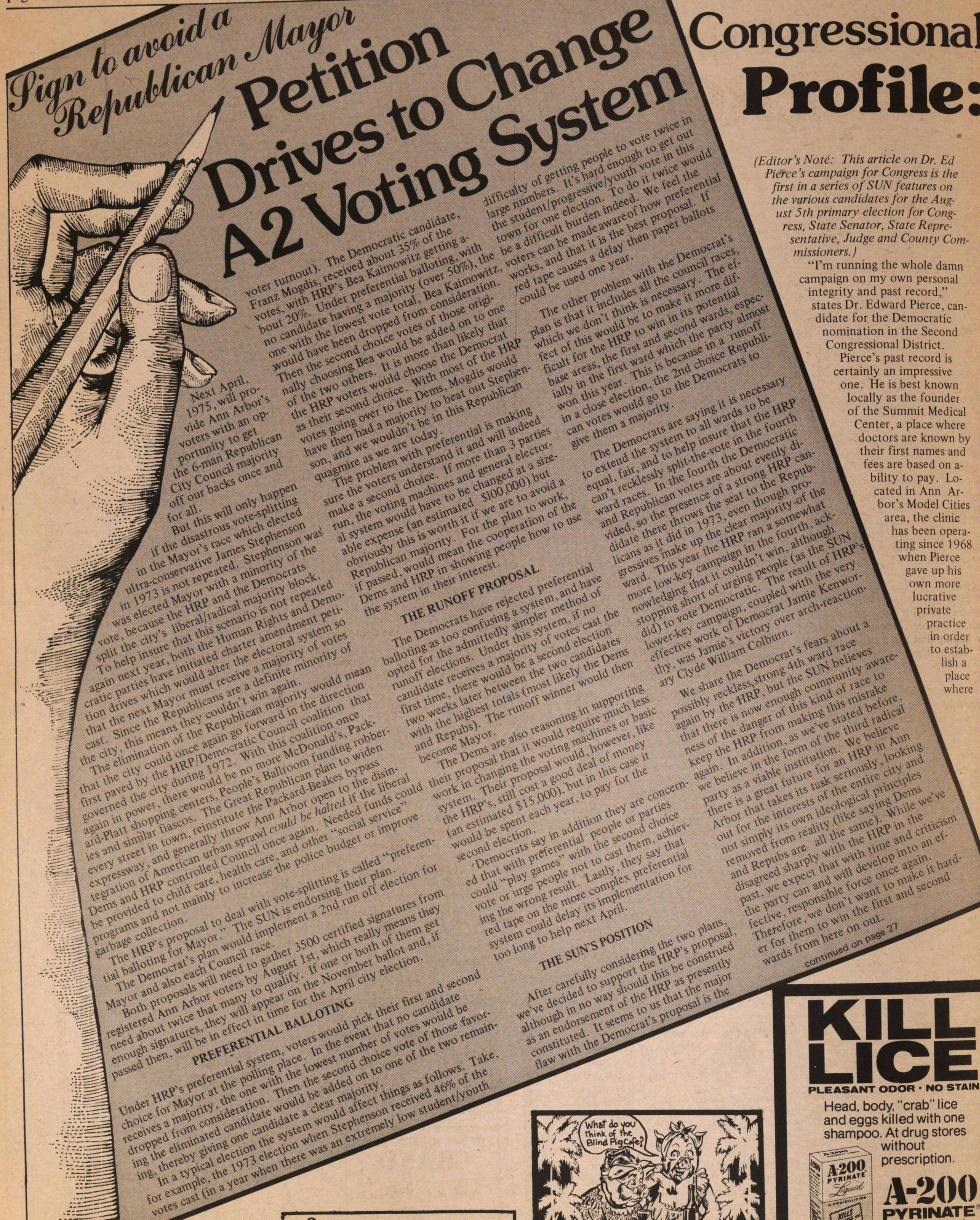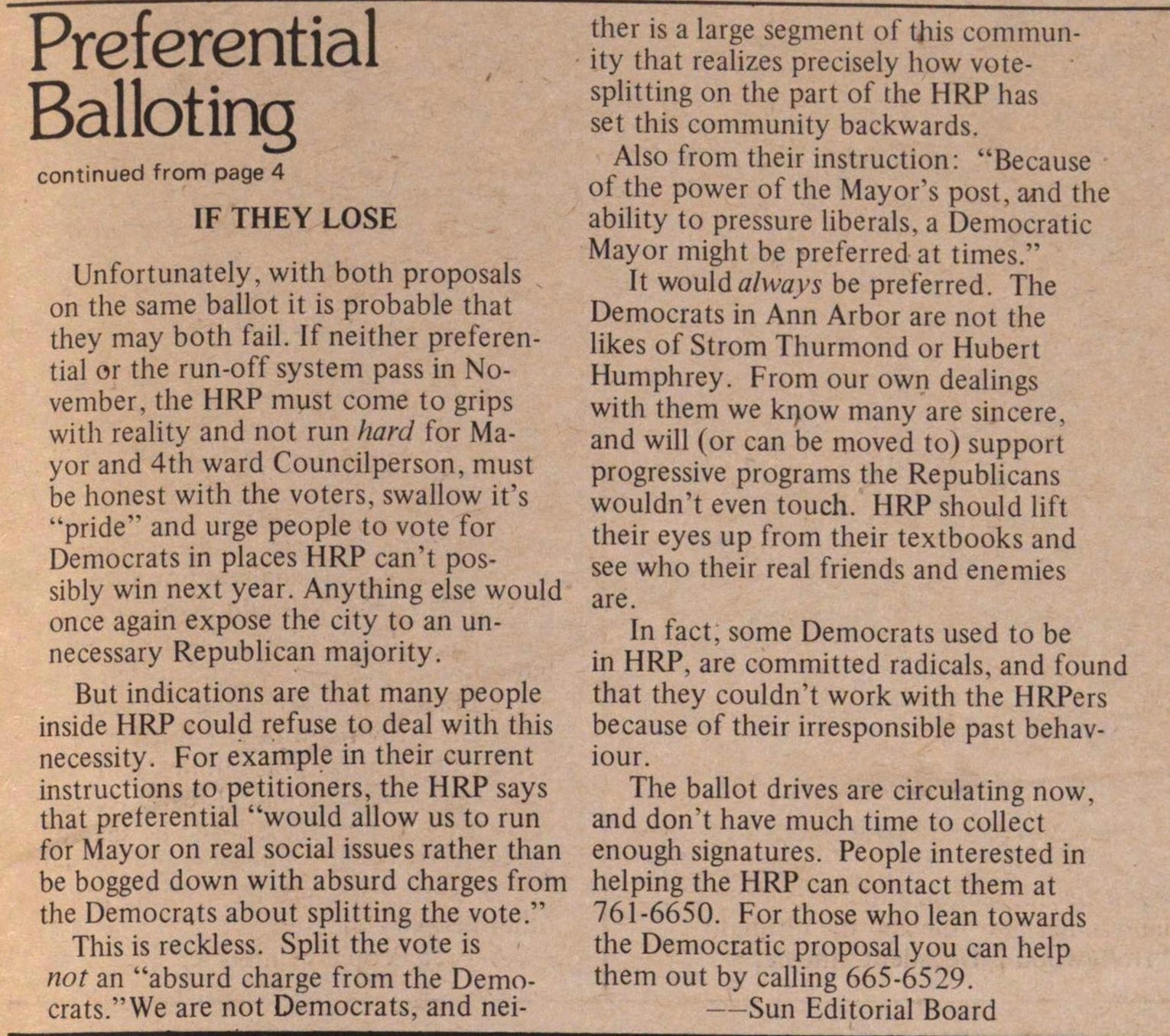Sign To Avoid A Republican Mayor Petition Drives To Change A2 Voting System


Next April, 1975, will provide Ann Arbor's voters with an opportunity to get the 6-man Republican City Council majority off our backs once and for all.
But this will only happen if the disastrous vote-splitting in the Mayor's race which elected utlra-conservative James Stephenson in 1973 is not repeated. Stephenson was elected Mayor with a minority of the vote, because HRP and the Democrats split the city's liberal/radical majority block. To help insure that this scenario is not repeated again next year, both the Human Rights ad Democratic parties have initiated charter amendment petition drives which would alter the electoral system so that the next Mayor must receive a majority of votes cast. Since the Republicans are a definite minority of the city, this means they couldn't win again.
The elimination of the Republican majority would mean that the city could once again go forward in the direction first paved by the HRP/Democratic Council coalition that governed the city during 1972. With this coalition once again in power, there would be no more McDonald's, Packard-Platt Shopping centers, People's Ballroom funding robberies and similar fiascos. The Great Republican plan to widen every street in town, reinstitute the Packard-Beakes bypass expressway, and generally throw Ann Arbor open to the disintegration of American urban sprawl could be haulted if the liberal Dems and HRP controlled Council once again. Needed funds could be provided to child care, health care, and other "social service" programs and not mainly to increase the police budget or improve garbage collection.
The HRP's proposal to deal with vote-splitting is called "preferential balloting for Mayor." The SUN is endorsing their plan.
The Democrat's plan would implement a 2nd run off election for Mayor and also each Council race.
Both proposals will need to gather 3500 certified signatures from registered Ann Arbor voters by August 1st, which really means they need about twice that many to qualify. If one of both of them get enough signatures, they will appear on the November ballot and, if passed then, will be in effect in time for the April city election.
PREFERENTIAL BALLOTING
Under HRP's preferential system, voters would pick their first and second choice for Mayor at the polling place. In the event that no candidate receives a majority, the one with the lowest number of votes would be dropped from consideration. Then the second choice vote of those favoring the eliminated candidate would be added on to one of the two remaining, thereby giving one candidate a clear majority.
In a typical election the system would affect things as follows. Take, for example, the 1973 election when Stephenson received 46% of the votes cast (in a year when there was an extremely low student/youth voter turnout). The Democratic candidate, Franz Mogdis, received about 35% of the votes, with HRP's Bea Kaimowitz getting about 20%. Under preferential balloting, with no candidate having a majority (over 50%), the one with the lowest vote total, Bea Kaimowitz, would have been dropped from consideration. Then the second choice votes of those originally choosing Bea would be added on to one of the two others. It is more than likely that the HRP voters would choose the Democrat as their second choice. With most of the HRP votes going over to the Dems, Mogdis would have then had a majority to beat out Stephenson, and we wouldn't be in this Republican quagmire as we are today.
The problem with preferential is making sure the voters understand it and will indeed make a second choice. If more than 3 parties run, the voting machines and general electoral system would have to be changed at a sizeable expense (an estimated $100,000) but obviously this is worth it if we are to avoid a Republican majority. For the plan to work, if passed, would mean the cooperation of the Dems and HRP in showing people how to use the system in their interest.
THE RUNOFF PROPOSAL
The Democrats have rejected preferential balloting as too confusing a system, and have opted for the admittedly simpler method of runoff elections. Under this system, if no candidate receives a majority of votes cast the first time, there would be a second election two weeks later between the two candidates with the highest totals (most likely the Dems and Repubs). The runoff winner would then become Mayor.
The Dems are also reasoning in supporting their proposal that it would require much less work in changing the voting machines or basic system. Their proposal would, however, like the HRP's, still cost a good deal of money (an estimated $15,000), but in this case it would be spent each year, to pay for the second election.
Democrats say in addition they are concerned that with preferential people or parties could "play games" with the second choice vote or urge people not to cast them, achieving the wrong result. Lastly, they say that red tape on the more complex preferential system could delay its implementation for too long to help next April.
THE SUN'S POSITION
After carefully considering the two plans, we've decided to support the HRP's proposal, though in no way should this be construed as an endorsement of the HRP as presently constituted. It seems to us that the major flaw with the Democrat's proposal is the difficulty of getting people to vote twice in large numbers. It's hard enough to get out the student/progressive/youth vote in this town for one election. To do it twice would be a difficult decision indeed. We feel the voters can be made aware of how preferential works, and that it is the best proposal. If red tape causes a delay then paper ballots could be used one year.
The other problem with the Democrat's plan is that it included all the council races, which we don't think is necessary. The effect of this would be to make it more difficult for the HRP to win in its potential base areas, the first and second wards, especially in the first ward which the party almost won this year. This is because in a runoff in a close election, the 2nd choice Republican votes would go to the Democrats to give them a majority.
The Democrats are saying it is necessary to extend the system to all wards to be equal, fair, and to help insure that the HRP can't recklessly split-the-vote in the fourth ward races. In the fourth Democratic and Republican votes are about evenly divided, so the presence of a strong HRP candidate there throws the seat to the Republicans as it did in 1973, even though progressives make up the clear majority of the ward. This year the HRP ran a somewhat more low-key campaign in the fourth, acknowledging that it couldn't win, although stopping short of urging people (as the SUN did) to vote Democratic. The result of the HRP's lower-key campaign, coupled with the very effective work of Democrat Jamie Kenworthy, was Jamie's victory over arch-reactionary Clyde William Colburn.
We share the Democrat's fears about a possible reckless, strong 4th ward race again by the HRP, but the SUN believes that there is now enough community awareness of the danger of this kind of race to keep the HRP from making this mistake again. In addition, as we've stated before, we believe in the form of the third radical party as a viable institution. We believe there is a great future for an HRP in Ann Arbor that takes its task seriously, looking out for the interests of the entire city and not simply its own ideological principles removes from reality (like saying Dems and Repubs are all the same). While we've disagreed sharply with the HRP in the past, we expect that with time and criticism the party can and will develop into an effective, responsible force once again. Therefore, we don't want to make it harder for them to win the first and second wards from here on out.
continued on page 27
Preferential Balloting
continued from page 4
IF THEY LOSE
Unfortunately, with both proposals on the same ballot it is probably that they may both fail. If neither preferential or the run-off system pass in November, the HRP must come to grips with reality and not run hard for Mayor and 4th ward Councilperson, must be honest with the voters, swallow it's "pride" and urge people to vote for Democrats in places HRP can't possibly win next year. Anything else would once again expose the city to an unnecessary Republican majority.
But indications are that many people inside HRP could refuse to deal with this necessity. For example in their current instructions to petitioners, the HRP says that preferential "would allow us to run for Mayor on real social issues rather than be bogged down with absurd charges from the Democrats about splitting the vote."
This is reckless. Split the vote is not an "absurd charge from the Democrats." We are not Democrats, and neither is a large segment of this community that realizes precisely how vote-splitting on the part of the HRP has set this community backwards.
Also from their instruction: "Because of the power of the Mayor's post, and the ability to pressure liberals, a Democratic Mayor might be preferred at times."
It would always be preferred. The Democrats in Ann Arbor are not the likes of Strom Thurmond or Hubert Humphrey. From our own dealings with them we know many are sincere, and will (or can be moved to) support progressive programs the Republicans wouldn't even touch. HRP should lift their eyes up from their textbooks and see who their real friends and enemies are.
In fact, some Democrats used to be in HRP, are committed radicals, and found that they couldn't work with the HRPers because of their irresponsible past behaviour.
The ballot drives are circulating now, and don't have much time to collect enough signatures. People interested in helping the HRP can contact them at 761-6650. For those who lean towards the Democratic proposal you can help them out by calling 665-6529.
-Sun Editorial Board
Article
Subjects
Freeing John Sinclair
Old News
Ann Arbor Sun